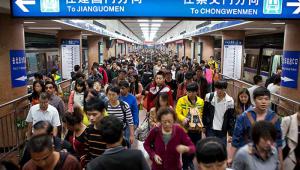The bank warned that this rebalancing of China’s economy – the world’s second largest – would be ‘uneven’, reflecting tensions between structural trends and near-term demand management measures taken by the government.
‘The rebalancing is not smooth, and quarterly growth is volatile,’ the bank’s China economic update report published on June 6 stated. It noted that China’s growth would continue to moderate over the medium term, and the structural shifts would become more evident.
‘The slowdown in the first quarter reflected a combination of dissipating effects of earlier measures to support growth, a weak external environment, and tighter credit, especially for real estate. However, economic activity, including industrial production, has shown signs of a pick-up in recent weeks,’ the report added.
‘The recent acceleration, which is likely to continue into the next two quarters [of 2014], reflects robust consumption, a recovery of external demand, and new growth supporting measures, including [public] infrastructure investments and tax incentives for small and medium-sized enterprises.’
The update notes that the policy responses to these medium-term risks should centre on fiscal and financial sector reforms, which were part of the government’s reform agenda outlined in November 2013. These include: effectively managing and supervising rapid credit growth and gradually reducing local government debt that has been accumulated through off-budget and quasi-fiscal activities.
The bank’s report came a day after the International Monterey Fund published its annual review of the Chinese economy, which forecast growth at 7.5% for this year.
The improving global outlook should support exports during the second half of the year, compensating for slowing domestic demand, the IMF said. It also said that inflation was expected to remain stable and the current account surplus is projected to be slightly smaller than last year’s.
Markus Rodlauer, deputy director of the IMF’s Asia and Pacific Department, said: ‘Among fiscal reforms, strengthening local government financed is a key challenge... [Also], tax reforms can help protect the environment while promoting more efficient and inclusive growth.’













